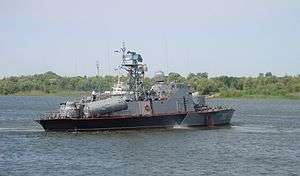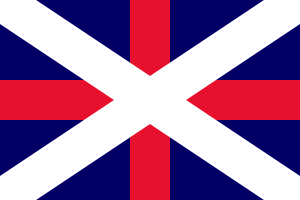Matka-class missile boat
 Caspian MRK 702 | |
| Class overview | |
|---|---|
| Name: | Matka class (Project 206MR Vikhr) |
| Operators: | |
| Preceded by: | Osa-class missile boat |
| In service: | 1977- present day |
| Completed: | 12 |
| Lost: | 1 |
| General characteristics | |
| Type: | Hydrofoil missile boat |
| Displacement: |
|
| Length: | 38.6 m (126 ft 8 in) |
| Beam: | 7.6 m (24 ft 11 in) |
| Draught: | 3.26 m (10 ft 8 in) |
| Propulsion: | 3 × M503 B2 Diesels; 15,000 hp (11,000 kW) |
| Speed: | 42 knots (78 km/h; 48 mph) |
| Range: |
|
| Endurance: | 5 days |
| Complement: | 30 |
| Sensors and processing systems: | Radar: Plank shave, Bass Tilt, SRN-207, High Pole |
| Armament: |
|
The Matka class is the NATO reporting name for a group of hydrofoil missile boats built for the Soviet Navy. The Soviet designation is Project 206MR Vikhr.
Design
These boats are the descendants of the Osa-class missile boat and are a heavily modified version of the Turya-class torpedo boat. There is only a single foil, the aft part of the hull hydroplanes at high speeds. They are air-conditioned and NBC-sealed. The SS-N-2 launchers are the same type as carried on the Project 61MR (“Mod-Kashin“)-class destroyers. Despite initial reports that they were good seaboats, later information revealed that the Soviets regarded them as cramped inside and top-heavy. Of thirteen planned ships, one was cancelled and another started but never completed. All were built in Leningrad.
After the breakup of the USSR, Russia discarded many and five went to Ukraine, one of which was later transferred to Georgia after a complete refurbishment.
Project 206.6
R-44 serves as a developmental ship for the Black Sea Fleet, and was the first vessel anywhere to carry the SS-N-25 “Switchblade” missile, in two quad-canisters. These were removed in 2000 but re-installed in 2003. In 1998, the SP-521 combat data system was installed. R-44 also has the AK-630М1-2 Roy CIWS which is two 30 mm gatling guns superimposed on each other, in place of the AK-630. More recently, the ship has been seen with no “Drum Tilt” radar and a large deckhouse between the bridge and mast.
Combat usage
On 9 August 2008 during the 2008 South Ossetia war, several media outlets reported that Tbilisi had been sunk in a nighttime action, either by a SS-N-9 “Siren” (likely from a Nanuchka-class ship) or a SS-N-12 “Sandbox” (from the Slava-class cruiser Moskva) fired by the Russian navy, which was moving a flotilla into position to enforce a 50-nautical-mile (93 km; 58 mi) Total Exclusion Zone (TEZ) around the Georgian Navy’s main homeport of Poti.
Tbilisi was in fact destroyed by Russian Airborne Troops on 8 August 2008 while in port at Poti. The ship lost at sea was most likely the Stenka-class patrol boat P-21 Giorgi Toreli. This would have appeared very similar on radar to a Matka-class vessel, having essentially the same hull and superstructure but different armament.
Trivia
In Russian language, word "matka" means uterus.
Ships
A total of 12 boats were built for the Soviet Navy. A gun boat version without hydrofoils was offered for export.
-
 Russian Navy - 3 boats are in service (3 boats Caspian Flotilla)
Russian Navy - 3 boats are in service (3 boats Caspian Flotilla) -
 Ukrainian Navy - 2 boats in service
Ukrainian Navy - 2 boats in service -
 Georgian Navy - 1 boat The Tbilisi (თბილისი) transferred from Ukraine, sunk by the Russian Airborne troops in Poti port during the 2008 South Ossetia war
Georgian Navy - 1 boat The Tbilisi (თბილისი) transferred from Ukraine, sunk by the Russian Airborne troops in Poti port during the 2008 South Ossetia war
See also
- List of ships of the Soviet Navy
- List of ships of Russia by project number
- HMCS Bras d'Or (FHE 400), a Canadian hydrofoil intended for anti-submarine duties
- HMS Speedy (P296), a Royal Navy jetfoil mine countermeasure vessel.
- Pegasus-class hydrofoil, a class of USN PHM
- Sarancha-class missile boat, a class of Soviet PHM
- Sparviero-class patrol boat, a class of Italian PHM
References
Notes
Bibliography
Gardiner, Robert (ed.) (1995). Conway's all the World's Fighting Ships 1947-1995. London: Conway Maritime. ISBN 0851776051. OCLC 34284130. Also published as Gardiner, Robert; Chumbley, Stephen; Budzbon, Przemysław (1995). Conway's all the World's Fighting Ships 1947-1995. Annapolis, MD: Naval Institute Press. ISBN 1557501327. OCLC 34267261.